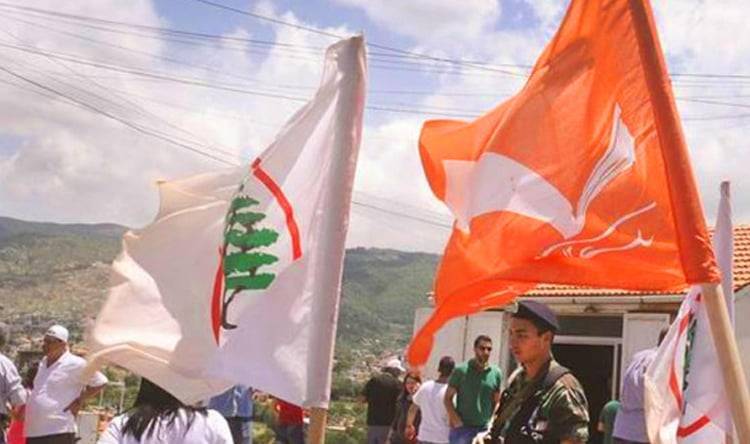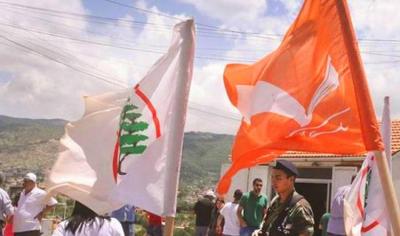The gap between the two Christian forces, the "Free Patriotic Movement" and the "Lebanese Forces," is widening regarding their approaches to political issues, primarily the presidential elections. Each presents its vision for the upcoming president and how to manage the state during the new term. Despite the sharp divergence and the media war between them, the "Free Patriotic Movement" seeks to reconnect and reopen communication channels, hoping to revive the "Maarab Agreement" that brought Michel Aoun to the Baabda Palace six years ago, possibly to pave the way for a similar experience with Gebran Bassil. However, the atmosphere suggests that the leadership of the "Lebanese Forces" has closed all lines of communication with this group after the bitter experience they had under Michel Aoun’s term, which they are not willing to repeat under any circumstances.
Based on the saying "there are no permanent enemies or permanent friends in politics," observers do not rule out the possibility of an understanding between the two sides again, as the presidential mandate cannot be achieved without the acceptance of one of the parties for the new president. They speak of a "groundwork that could establish rapprochement between them," starting from their common perspective on the necessity of a two-thirds majority in Parliament for the election of the president, their rejection of urgent legislation given that Parliament has turned into an electoral body post-presidential vacancy, and their agreement that the caretaker government should not usurp the powers of the president and exercise them without limitations.
The convergence on constitutional principles does not imply that they could agree on controversial issues, the most important being the election of the president and the path of state-building. Ghias Yazbek, a member of the "Strong Republic" bloc, sees that "agreeing on the quorum for election sessions falls under constitutional axioms, with the backdrop of reassuring Christians, but when we reach implementation, we contradict each other on everything because the movement does not mean what it says." Yazbek tells "Asharq Al-Awsat": "If they respected the presidency, they would not have voted by blank ballot. They want a consensual president named Gebran Bassil, while we want a sovereign president named Michel Moawad," considering that "the attempt of the Free Patriotic Movement to open up to the Forces and other political powers has one interpretation: Hezbollah's rejection of Gebran Bassil's candidacy for the presidency."
The leadership of the "Lebanese Forces" rejected a visit from a parliamentary delegation representing the "Free Patriotic Movement" to discuss presidential priorities, without providing reasons. Deputy Ghias Yazbek reminds us, "In 2016, they came to Maarab in order to reach the presidency, and after Michel Aoun was elected, they distanced themselves from everything. Now they want to get back to the Baabda Palace, and if it requires Gebran to go to Maarab and spend many days there to ensure his election as president, he will not hesitate."
Yazbek adds: "We want a strong president by the constitution and the state, while they want a president bolstered by the 'statelet'." He points out that "Gebran Bassil and his uncle Michel Aoun embody the stark model of a man of power, not of state who protects himself," lamenting that "the state is currently not based on constitutional concepts, but on a concept governed by Hezbollah, through the exercise of dominance using weapons."
The interests of the "Free Patriotic Movement" and the "Lebanese Forces" converge on rejecting the election of former MP Suleiman Franjieh from the "Marda" Party as president and opposing any candidate not enjoying popular representation or political cover from either side. Walid Ashkar, a member of the political council of the "Free Patriotic Movement," tells "Asharq Al-Awsat" that "the attempt of the Free Patriotic Movement to open up to the Lebanese Forces comes in the context of prioritizing the presidential elections, as it takes precedence over urgent legislation or the work of the caretaker government." He expresses regret that "the Lebanese Forces" "deals with the Movement with a background of the political negativity they have become accustomed to practicing, and therefore they refused to receive a delegation from the Movement to discuss the presidential entitlement."
The relationship between the two parties experienced a major setback following the uprising on October 17, 2019, after which ministers from the "Lebanese Forces" resigned from the government and the latter announced its support for the "revolution" and its disengagement from the governments of Hassan Diab and Najib Mikati, which represented the March 8 team. However, the relationship reached a complete rift just before the last parliamentary elections, especially after the issues between the two parties in universities and mixed areas. Yet, Walid Ashkar emphasizes that "communication is always present between the two sides through Deputy Ibrahim Kanaan and Deputy Melhem Riachi."
He continues: "Despite all the crises, the thread of communication remains between the two parties, and Kanaan's and Riachi's ongoing communications are sometimes used to ease certain tensions." Ashkar notes that "the movement" "wants a president with significant popular representation, and if one of the parties decides to support that candidate, it means that the popular basis has been bestowed upon him," affirming that "this card will not be given to Suleiman Franjieh, as he does not possess the qualifications contained in our presidential paper, and he does not adhere to its provisions; all the ongoing attempts do not lead to a president of the republic."




